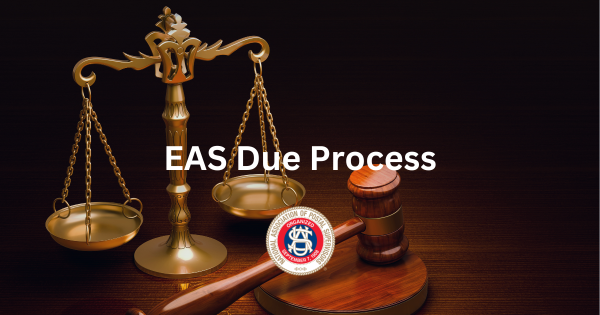EAS Due Process
EAS Due Process
By John Aceves
Former NAPS Secretary/Treasurer
The U.S. Postal Service operates under a system of rules and regulations designed to “hopefully” ensure fairness and proper conduct. One critical aspect of these regulations for Executive and Administrative Schedule (EAS) employees is covered under the Employee and Labor Relations Manual (ELM). Specifically, in Section 650—“Nonbargaining Disciplinary, Grievance, and Appeal Procedures.” The current ELM version is #55.
Due process is a fundamental principle enshrined in the U.S. Constitution in amendments 5 and 14. They ensure fair legal proceedings with proper notice and the opportunity for individuals to be heard. This constitutional protection underscores the importance of due process in maintaining justice and fairness in all aspects of governance, including employment practices in the Postal Service.
Due process is essential for maintaining trust and integrity. It ensures employees are not subject to arbitrary or unjust treatment and any decisions affecting their employment are made based on clear, consistent and fair criteria. This principle protects employees’ rights and promotes a positive and productive work environment. Unfortunately, there al ways are some senior managers who don’t believe this.
Section 650 outlines the specific procedures and protections afforded EAS employees. These provisions are designed to ensure employees are in formed of the reasons for any adverse effects that may lead to adverse actions and that they can respond and defend themselves.
Understanding your rights under Section 650 is crucial for ensuring your due process. It will help you understand the specific procedures and protections available to you.
Contact your local NAPS representative if you believe your due process rights are being violated. They can provide guidance, support and representation throughout the process.
If you receive notice of a proposed action, always appeal with the appropriate ELM 650 process. It’s critical that you respond within the specified appeal time period and provide a thorough and well-documented response. Present any evidence or arguments that support your case. Your NAPS representative can assist you in navigating the appeals process.
Due process is a vital component of fair and equitable treatment in the USPS. By knowing the provisions of Section 650 and taking appropriate actions, you can help ensure fair and respectful treatment.
Remember, due process is not just a policy, it is a constitutional right that protects all employees, fostering a just and transparent work environment. If you feel your rights are being infringed, do not hesitate to seek representation.
Take action to uphold the principles of due process. Stay informed and know your EAS due process rights.
Another important issue to understand is the use of your personal vehicle. Be sure to read Management Instruction FM-640-2015-3, “EAS Privately Owned Vehicle (POV) Program.” The document contains important guidelines of which you should be aware before using your POV for postal business.
Keep in mind if you are using your personal vehicle and are involved in a vehicle accident, the responsibility will fall on you and your insurance. My personal recommendation is to avoid using your POV for any postal task requiring you to drive.
Instead, request an administrative vehicle through your local channels for the task the USPS has assigned you.
Hasta luego.
